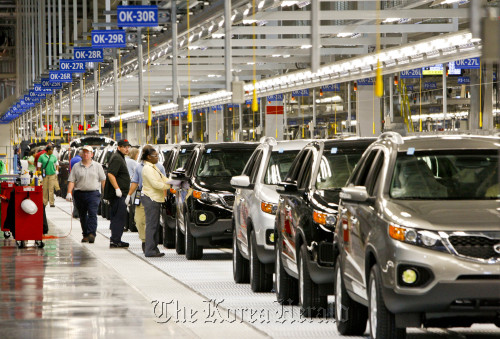Hyundai Motor and its affiliate Kia Motors emerged as one the world’s top five automakers in global sales last year, selling more than 5 million vehicles.
About a decade ago, the two companies under the wing of Hyundai Motor Group ranked 11th worldwide in total sales volume.
Climbing six notches in less than 10 years was not a simple accomplishment, as it required stepping over global players including Honda, Nissan, Fiat, Chrysler and Peugeot.
Hyundai and Kia have continued to expand their global presence over the past few years by showcasing a variety of models with high-end technologies and unique designs.
Their noteworthy performance could be seen in major automobile markets such as the United States, China, Brazil, India and Europe.
Hyundai-Kia saw their U.S. market share exceed 10 percent for the first time in May, mainly thanks to robust demand for new models.
The automakers under the wing of Hyundai Motor Group sold 107,426 vehicles in the U.S. last month, up 21 percent from a year earlier.
They captured 10.1 percent of the American market, where the total sales of global automakers came to about 1.06 million units.
The combined market share of mid-sized sedans made by the two companies ranked first in the United States last month.
About a decade ago, the two companies under the wing of Hyundai Motor Group ranked 11th worldwide in total sales volume.
Climbing six notches in less than 10 years was not a simple accomplishment, as it required stepping over global players including Honda, Nissan, Fiat, Chrysler and Peugeot.
Hyundai and Kia have continued to expand their global presence over the past few years by showcasing a variety of models with high-end technologies and unique designs.
Their noteworthy performance could be seen in major automobile markets such as the United States, China, Brazil, India and Europe.
Hyundai-Kia saw their U.S. market share exceed 10 percent for the first time in May, mainly thanks to robust demand for new models.
The automakers under the wing of Hyundai Motor Group sold 107,426 vehicles in the U.S. last month, up 21 percent from a year earlier.
They captured 10.1 percent of the American market, where the total sales of global automakers came to about 1.06 million units.
The combined market share of mid-sized sedans made by the two companies ranked first in the United States last month.

Sales of Hyundai’s popular Sonata sedan reached 22,754 units in May, while Kia sold 7,401 Optima sedans in the one-month period. This pushed up the market share of the two models to 19 percent of all mid-sized sedans sold in the U.S., surpassing GM’s 18.8 percent.
The number represents the first time that cars made by Hyundai and Kia took the top market share in one of the world’s largest automobile markets.
“The ranking signifies that U.S. consumers no long consider Hyundai and Kia to be low-end car brands,” a company spokesman said.
The automotive group’s market share stood at sixth place in 2009 and rose to fourth in the mid-size car segment in 2010.
Coming into 2011, the two companies made headway on the strength of good consumer reviews and following the massive March 11 quake that hit Japan and disrupted production at plants run by Toyota and Honda.
In China, Hyundai-Kia saw their sales come in at 1.1 million units in 2010, up 28.2 percent from a year earlier.
With the increase, the group took 9 percent of the Chinese market and became the second-largest automotive group operating in China.
Hyundai was fourth with about 700,000 units sold in China while Kia came in at 13th with 330,000 units.
In addition, the two carmakers’ sales in the U.S. also came in at a record high last year with 830,000 vehicles sold in the market.
Hyundai Motor broke ground on its first production factory in Latin America last February, unveiling ambitious plans to surpass Ford Motor Co. as the fourth-biggest player in Brazil by the end of 2013.
Hyundai Motor is targeting 10 percent of Brazilian car sales with annual production of 150,000 vehicles at its new plant in Piracicaba in Sao Paulo state.
“In 2010, without a factory here, we reached a market share of 3 percent. With local production, this will be 10 percent, overtaking Ford,” he told reporters at the ground-breaking ceremony.
Hyundai sold a total of 106,012 vehicles last year, while Ford sold 336,297 for a 9.6 percent market share in Brazil.
Strong economic growth of about 7.5 percent annually and a rapidly growing middle-class have fueled strong demand for new cars in Latin America’s largest market, pushing production to a record high last year. Brazilian auto sales reached their highest annual total of 3.5 million vehicles, up 12 percent from 2009.
Hyundai is the latest carmaker to challenge there as competition heats up for global players who already produce vehicles in Brazil, such as Italy’s Fiat, Germany’s Volkswagen and U.S.-based General Motors. Those four giants take up 80 percent of sales in Brazil.
By Kim Yon-se (kys@heraldcorp.com)









![[Kim Seong-kon] Democracy and the future of South Korea](http://res.heraldm.com/phpwas/restmb_idxmake.php?idx=644&simg=/content/image/2024/04/16/20240416050802_0.jpg&u=)







![[KH Explains] Hyundai's full hybrid edge to pay off amid slow transition to pure EVs](http://res.heraldm.com/phpwas/restmb_idxmake.php?idx=652&simg=/content/image/2024/04/18/20240418050645_0.jpg&u=20240418181020)

![[Today’s K-pop] Zico drops snippet of collaboration with Jennie](http://res.heraldm.com/phpwas/restmb_idxmake.php?idx=642&simg=/content/image/2024/04/18/20240418050702_0.jpg&u=)